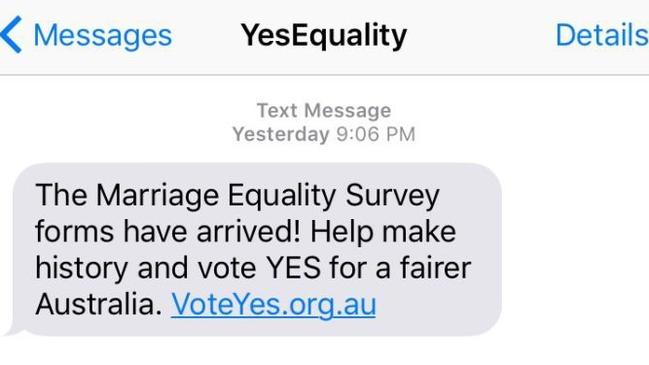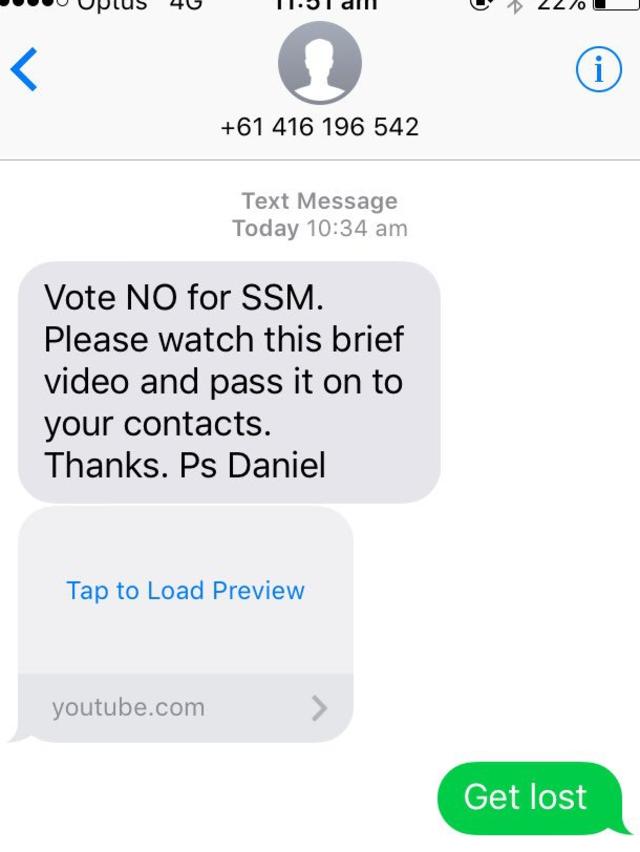Privacy concerns over Yes campaign vote’s bulk SMS
The bulk SMS sent in favour of same sex marriage has sparked calls for changes to privacy regulations.

The bulk SMS sent in favour of same-sex marriage has sparked calls for changes to privacy regulations, after hundreds of thousands of Australians were bombarded with text messages without their permission.
Coalition MPs who support traditional marriage yesterday questioned whether the Yes campaign had complied with political authorisation requirements and complained that messages had been sent to minors without parents’ consent.
The tactic also triggered calls to reform the rules governing mass communication with experts suggesting the messages could have cost as little as 2c each, with the Yes camp unable to confirm how many were actually sent.
Federal minister Concetta Fierravanti-Wells told The Australian the decision to send mass text messages would “not have been a cheap exercise” and that it “just goes to show how cashed up the Yes campaign is”.
“There is a legitimate question about the authorisation,” she said. “In terms of sending it to minors, I think there are legitimate concerns about that.”
Finance Minister and acting Special Minister of State Mathias Cormann told The Australian the text message met all legal requirements. “My advice from the Electoral Commissioner Tom Rogers is that the relevant messages were duly authorised consistent with all the relevant legal requirements,” he said.
Former prime minister Tony Abbott questioned whether the Yes campaign had engaged in the “harvesting of people’s private mobile phone numbers” and said voters did not like being “lectured by the politically correct establishment”.
The Australian Communications and Media Authority (ACMA) received hundreds of complaints about the text messages but noted the use of bulk SMS messages did not represent a breach of either the Do Not Call Register Act or the Spam Act because the texts did not have a “commercial purpose”.

“Communications about political matters do not usually include a commercial element,” ACMA said in a statement.
The Yes campaign yesterday denied it had breached any rules governing mass communications and attacked the use of robocalls by their opponents, with spokesman Clint McGilvray saying a computer had randomly generated the numbers that the message was sent to.
“It’s a computer-generated SMS message to encourage people to get out and vote,’’ said Mr McGilvray from Equity Campaign. “It’s a one-off. We have no knowledge of who the messages were sent to. We haven’t bought a data base.’
Carl Krumins, chief executive of SMSGlobal which runs a service offering bulk SMS services to businesses, said he believed more mass communications, excluding emergency alerts, should be “subject to the Spam Act”, which requires an option to unsubscribe and consent to receive.
“The process for sending out the bulk SMS, in the thousands or even millions, is actually quite simple. The Marriage Equality Party used an SMS gateway, much like ours, to distribute the text messages on mass. To do this, they would have uploaded their data and receivers’ details into the system,” Mr Krumins said. “It’s then as easy as crafting the content and hitting send.”
Parents across the nation also told The Australian they were concerned about their children — who some on the Yes side have suggested should be shielded from the political campaign — receiving unwarranted text messages.
Perth father Glenn Rankine said his 16-year-old son had received the text on Saturday. “My concern is he was only 16. We’ve explained what’s going on to him so he knows if he ever feels uncomfortable he can ignore it, and that’s what he’s done,” he said.
Melissa Coffey, from southwest Victoria, was angered when her 15-year-old received the text at the weekend. “My daughter got the text and she is 15. She was pretty nonplussed about it but I still wasn’t impressed,” Ms Coffey said.
The Office of the Australian Information Commission said the texts did not appear to breach privacy rules because the SMS message was sent by using “random computer-generated mobile numbers, not from collected numbers”.
The Yes campaign was late yesterday saying its text messages had resulted in about 170,000 people clicking through to their website, while about another 20,000 had signed up to volunteer as a result.
Australian Christian Lobby managing director Lyle Shelton argued that people “felt like their privacy had been invaded” and confirmed that his “No-voting daughter received one”.






To join the conversation, please log in. Don't have an account? Register
Join the conversation, you are commenting as Logout